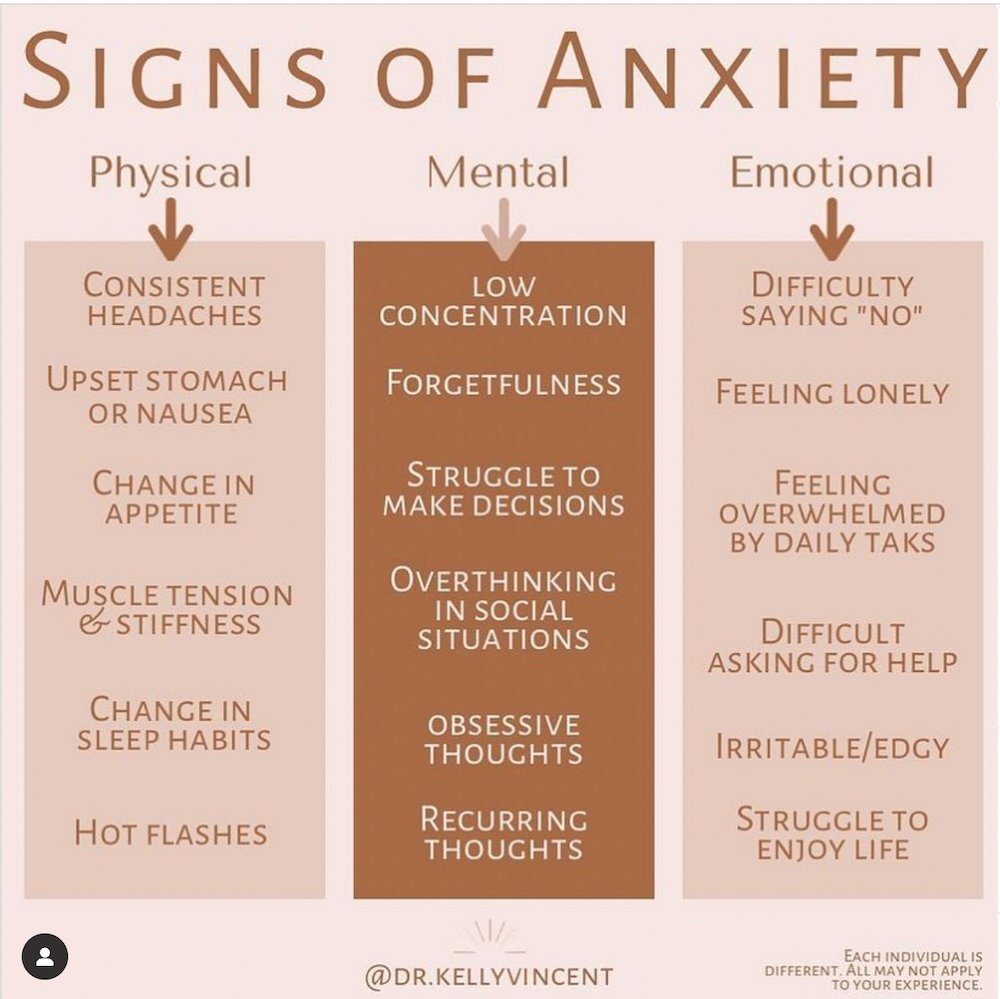The 9 Tell-Tale Signs Of Anxiety That Don’t Look Like Anxiety
by Marissa Pomerance
It’s 2022—how can anyone NOT have anxiety?
And whether it’s health anxiety or a fear of flying or just a general worry that the world is ending, anxiety annoyingly comes in a lot of different forms. “We often see anxiety causing things like upset stomach, ‘butterflies’ feeling, a feeling of unrest or inability to sit still, sweating, trouble focusing, racing thoughts, difficulty with sleep, and increased or decreased appetite,” says licensed psychotherapist Whitney Goodman.
Most of us know the obvious signs to look out for, but the symptoms of anxiety are (also annoyingly) more broad than we may realize. So we wanted to explore some lesser-known symptoms that we often don’t realize are anxiety-induced.
The point of this list isn’t to scare you. Nor is it for you to say, “well everything I feel is anxiety, and therefore I don’t need to go to that doctor/take that medication/figure out why I’ve had back pain for 7 months.” The point is to help us identify which of our feelings and behaviors are fueled by anxiety, because even just recognizing them means better self-insight, which is powerful.
1. Chronic fatigue:
Dealing with anxiety on a regular basis is mentally exhausting. Our brain is constantly spinning from the cycle of anxious thoughts, and then our brain trying to control or get rid of those anxious thoughts. Wondering why your heart is pounding and then wondering if it’s a heart attack and then realizing it’s probably anxiety and then chastising yourself for being anxious and then trying to get rid of the anxious feeling is SO TIRING.
And the stress takes a toll on our bodies, too; being in a constant state of fight uses a lot of energy. It’s no wonder we’re always tired.
2. Burnout:
Like we said: anxiety is exhausting. So it’s really no surprise that it can also lead to burnout. Living in a constant state of stress doesn’t just make us physically and mentally exhausted, it also affects our motivation, makes us feel disinterested and indifferent, and causes us to withdraw, which are all associated with burnout.
3. Avoidance:
Of course there are plenty of things we avoid doing simply because we don’t want to (*cough* taxes). But avoidance is more than procrastinating on our taxes. It’s a maladaptive coping mechanism—a pattern of behaviors we use to escape from our anxious thoughts and feelings. Like numbly staring at Instagram from 6 hours at bedtime because we’re trying to avoid the anxious thoughts that inevitably arise when our head hits the pillow. Or avoiding responding to friends’ texts because you’re feeling socially anxious and don’t want to see anyone right now.
If you’re regularly avoiding things you used to love, or normal parts of everyday life (like sleeping), it might be time to notice how that avoidance is related to anxious thoughts.
4. Codependence:
Anxiety doesn’t just affect us. It affects our loved ones and our partners. In fact, there’s even an attachment style called “anxious attachment,” which often leads to codependent behaviors. Our anxiety over not being worthy or loveable, and our fear of abandonment are often at the root of codependency. We also try to appease and people-please because we fear being rejected.
5. Numbness:
Welp, this one I experienced myself recently. And even as a seasoned anxiety sufferer, I had no idea why my toes suddenly went completely numb (and took about 20 minutes to regain feeling and blood circulation) until I was able to trace the onset of numbness back to a moment of panic. But yep! Anxiety causes the blood vessels to constrict, reducing blood flow to parts of the body (like the hands and feet), leading to numbness and tingling.
6. Controlling everything:
At the root of anxiety is uncertainty: we don’t know what’s going to happen, so our brain latches onto worst case scenarios and catastrophizes. And often, that leads to us needing to control all the variables around us to feel safe. If we’re panicking because someone we love is sick, we might start doing research into potential treatments and practitioners, and then obsess over their test results and doctor’s appointments; by controlling the situation, it allows us to feel like we’re creating the outcome we desire, even if we have no control over that outcome.
7. Indecision and Procrastination:
While feeling anxious over an uncertain future can lead us to jump into action and try to control everything around us, it can also have the opposite effect, too. Our anxious minds become flooded with all the potentially catastrophic consequences of our various decisions, paralyzing us with indecision, and causing us to procrastinate making any choices at all.
If we’ve been suffering from back pain, but we’re anxious that it’s actually liver failure (it’s probably a pulled muscle, but ya know, health anxiety), we might struggle to decide on the best course of action: what doctor should I see, what tests should I have done, should I go to a physical therapist? All of that—the fear that we’ll find out we have 3 months to live, the indecision over what to do next—is so overwhelming, that we’d rather just sweep it under the rug and put off dealing with it.
8. GERD/Acid Reflux:
Let’s be clear that anxiety isn’t the only or even main reason for GERD, acid reflux, or heartburn. But it can absolutely make it worse, especially if you’re already prone to these issues.
Experts agree that there’s a cyclical relationship between anxiety and acid reflux; anxiety itself may cause physiological changes in our body that contribute to acid reflux, and that discomfort leads to more anxiety, and on and on. And this one is a real doozy for me. Because I struggle with acid reflux, which often causes heartburn-induced chest pains (and even sometimes, shortness of breath), which makes me anxious, which then makes these symptoms worse.
But understanding this relationship helps me to nip this issue in the bud, like by popping an antacid before I get on a plane, or when I know I’m going to be in a stressful situation.
9. Depersonalization:
This one is barely known, but it’s a scary one. Sometimes, panic attacks can be so intense, they can lead to an extreme reaction called depersonalization (or, derealization) where we feel like we’re losing our grip on reality; we feel like we’re outside our own bodies, and that the things around us aren’t real. Things look distorted to us. Sounds are fuzzier or more confusing. But, it doesn’t mean we’re literally losing our grip on reality. It means that our anxious bodies are pumping out so much adrenaline, and sending so much blood from the brain to the muscles, that it can temporarily affect how the brain works. If you’re now suddenly getting anxious about THIS, just know that experts agree it isn’t dangerous, and once you calm down, the feeling will start to pass.
Of course, it’s important to remember that not ALL of our symptoms are anxiety-induced. According to Goodman, it “can take a long time for people to really piece apart what is being caused by anxiety and what is being caused by something else. During this process, it’s important for people to be vigilant and not dismiss their symptoms, especially if they don’t seem to be getting better despite working on the anxiety.”
But the above guide is also helpful when we’re caught in a spiral. So the next time my toes go completely numb after a particularly anxious moment, I can remember that this is a normal bodily response to stress, which helps me self-soothe, let go of my anxious thoughts, and rejoice when I quickly regain feeling in my toes.
Marissa Pomerance is the Managing Editor of The Candidly. She’s a Los Angeles native and lover of all things food, style, beauty, and wellness. You can find more of her articles here.





